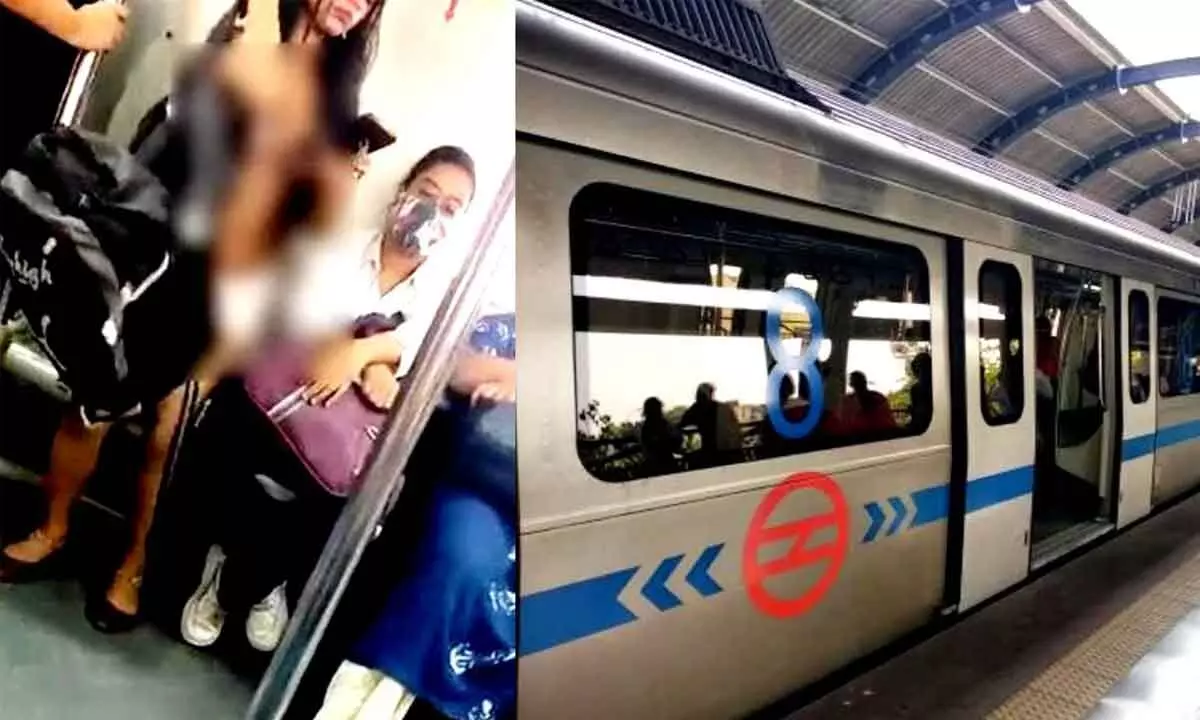Women’s publicity stunt in Metro becomes a dressing topic of debate
For some this Metro woman may be the new ‘icon’. Feminists may say it is about the quintessential freedom of expression for women, but for the majority, it is a cheap way to seek publicity
image for illustrative purpose

Amid the Adani-Hindenburg noise, the protests and the marches on various issues, the political accusations and allegations, a little video suddenly took social media by storm.
It was the footage of a skimpily-clad woman travelling on the Delhi Metro that was widely circulated and talked about.
Wearing a bralette and the miniest skirt possible, apparently influenced by the social media favourite, Uorfi Javed, the young woman was a picture of confidence as she got her 15 minutes of fame. The woman is seen sitting or standing inside the Metro with no eyes prowling on her. All her co-passengers are seen immersed in their mobile phones and a semi-clad woman seems to be of least interest to them.
But for the world outside the Delhi Metro, the video clip appeared to be shocking and the woman 'questionable'. The woman is not from the reel world, but the real one. Actors do photo-ops, create scenes and entertain audiences. This woman on the Metro did what many are describing as non-conformist, even revolting, but for some, it is all about freedom. In any case, the woman's move is too bold to be dismissed.
Perhaps that is what she wished for - to be talked about, to be noticed. "There's no such thing as bad publicity," an American showman of the mid-19th century PT Barnum had said. True to this notion, the woman did what she did and, in the process, got what she aspired for - publicity. Next, she may land in some reality show or may even get a film offer.
"Not a bad deal. What she did needs guts. If she gets into films or reality shows, her life is made," said a colleague in the office, a women journalist examining the video and discussing it threadbare.
"She is a vile, bad influence. Wonder what her family is like." "How can you talk like this... it's not fair... she did what she wanted to do." "No, it is not right. Look at the number of cases against women."
"But what and how you dress has no link with the cases of physical assaults. It is all in the mind. When an infant or an 85-year-old woman is raped, the reason is not the dress, but the pyscho mentality." "She was not harmed by anyone while travelling on the Metro. Did she wear something similar outside as well." "She is so ugly to look at."
The discussion was intense and seemed to be reaching nowhere. As meeting the deadline for story releases was too pressing, the discussion was abandoned. And, the next stories to come were the woman's reaction and the Delhi Metro Rail Corporation's statement.
The woman, a 19-year-old, has this to say: "I was exercising my freedom to wear what I want to wear.... I don't care what people have to say." She said what we all knew she would say, and she also added that she has "no interest in the publicity stuff." The latter part of the statement may have no takers, because she has got the attention she may or may not have wanted. The tumultuous reaction forced the DMRC to release a statement.
"DMRC expects commuters to follow social etiquette and protocols. Commuters should not indulge in any activity or wear any attire which could offend sensibilities of fellow passengers. DMRC's Operations & Maintenance Act in fact lists out indecency as a punishable offence."
"We appeal to all our passengers to kindly maintain decorum while travelling in a public transport system like the Metro. Issues such as the choice of clothing when one's travelling is a personal matter, but passengers are expected to self-regulate their conduct in a responsible manner," said Anuj Dayal, Principal Executive Director, Corporate Communications, DMRC.
The DMRC's statement on appropriate attire for public transport could be termed iconic. It's both a warning and an appeal. After this statement, it is to be seen what the woman's next move will be. Will she continue in some other style and do something equally bizarre?
PT Barnum's quote on bad publicity is much like Oscar Wilde's saying: "There's only one thing in the world worse than being talked about, and that is not being talked about." The woman has understood the concepts of Barnum and Oscar Wilde. Perhaps, why just this woman, a number of people across society, and the politicians above all, are just following the concepts to stay in the public gaze.
Another video of a woman dancing at a Delhi Metro station also has gone viral. In the video, the woman dressed in a red saree was seen dancing to a Bhojpuri song at a Delhi Metro station. The woman has written in her Instagram account: "Yar, bahut himmat chahiye Metro mein dance karne ke liye (It requires a lot of guts to dance in the Metro.)"
To stay in news and get the necessary traction on social media, no matter how, is the aim of such people. For those wanting to lead, it is not anymore about principles or setting the right example. It is all about staying in news and getting as many likes and responses as possible on social media.
For politicians, slaying the opponent by words is the new norm. Issues and problems of the people are not the subjects that dominate political discourse anymore. Building narratives is the new norm.
The Delhi Metro woman has said that Uorfi Javed, the 25-year-old social media influencer, is her icon. And for some, this Metro woman may be the new 'icon'. Feminists may say it is about the quintessential freedom of expression for women, but for the majority, it is a cheap way to seek publicity. The debate rages.

